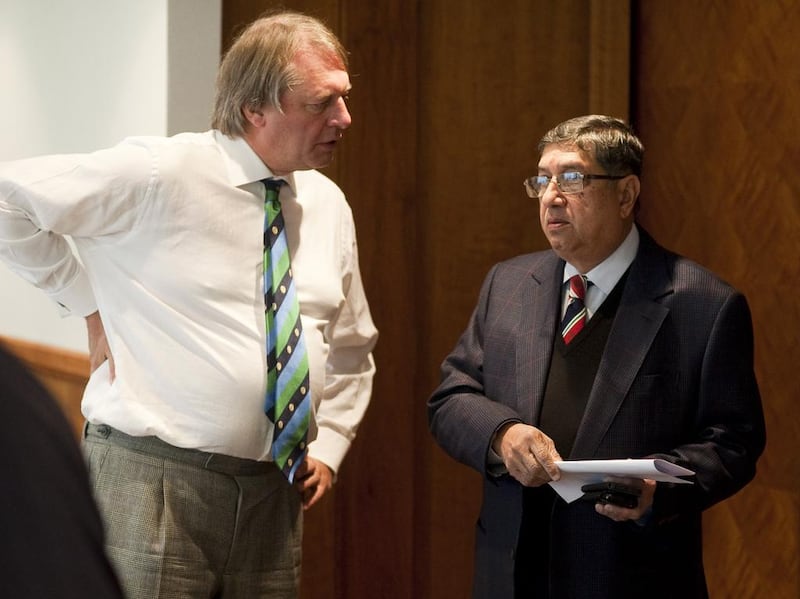Corruption, it has been said at least a million and three times, is the most serious threat to the game. Yet two stories over the last few days would suggest that the fight against it is going to be treated with less seriousness and considerably more politicking in cricket’s new dispensation.
One report, from ESPNcricinfo, revealed plans for the boards of India, Australia and England, as well as the chief executive of the International Cricket Council (ICC), David Richardson, to instigate a vast reformation of the anti-corruption and security unit (ACSU).
A new ACSU, divested of its powers, would report to the new chairman of the ICC, the incoming N Srinivasan for the moment, rather than the ICC chief executive.
The other report, in the UK’s Daily Telegraph, was more alarmist. The ACSU, in its current shape, was to be scrapped because it has failed to police the game. In this plan, the ACSU would become an Interpol-like hub of information-gathering and analysis, rather than investigation.
Instead, anti-corruption units (ACU) of full member boards would be further strengthened and better-coordinated to fight the Most Serious Threat.
The ICC were moved to issue a statement. They acknowledged that, yes, a review is planned, but that is merely an ordinary, corporate exercise, a department responding to the changing environment around it. The ACSU has not failed, the review has not even begun and its scope has not been discussed. In other words, nothing to see here folks, move on, thanks.
A couple of thoughts. A review is probably needed. The rise of domestic Twenty20 leagues necessitates as much; currently, outside of internationals, the ACSU’s services are employed by the Indian Premier League (IPL), the Bangladesh Premier League (BPL), the Caribbean Premier League (CPL) and the Champions League T20.
As opposed to when the ACSU was born in 2000, domestic matches around the world are now available to watch and TV is the lifeblood of bookies and betting syndicates. The intention to revamp can be seen to be clean.
But to further defang a body that has fairly limited powers anyway? Criticising the ACSU has always felt like having a pop at a boxer for not throwing punches and ignoring that his hands have been tied behind his back.
Greater threats should mean greater, not reduced, powers. If the Big Three has their way and what little power the ACSU has goes to individual ACUs, that hacks away at one of the central tenets of the ACSU – its independence.
If needed, how can any ACU be expected to run a free, fair investigation against members of its own board, its own employers? Imagine a world not too dissimilar to ours, in other words, where the Board of Control for Cricket in India's (BCCI) anti-corruption unit may be called to investigate its president.
Of even more interest than potential ramifications, though, is to wonder about the political motivations behind them. Part of it seems to be straightforward, about control. The England and Wales Cricket Board (ECB), Cricket Australia (CA) and the BCCI are gradually taking control of everything else, so something as critical as the ACSU should also naturally fall under their ambit.
But wanting to ultimately reduce its independence is another worrying reflection on the manner in which they intend to operate. Who is to say, for instance, that these moves are not pointed retaliation at the ACSU head, YP Singh?
It was Singh, after all, who, according to the Justice Mudgal report into the IPL spot-fixing scandal, warned the league of franchise owners and officials who were involved in illegal betting. Singh was asked about the authenticity of his reports and he told the BCCI he had no “actionable information”.
Note that the report does not mention whether he was asked to carry out further investigation. That is how a home board’s employment of the ACSU works. The request to investigate must come from the home board, as it did from the Bangladesh Cricket Board (BCB) in the BPL investigation.
It is also worth raising an eyebrow over the origin of the stories, from Australia and England, home to the two boards flanking the BCCI. One immediate reaction was outrage at the prospect of the ACSU reporting directly to Srinivasan when he becomes ICC chairman, a man currently ousted as head of his own board as he is dragged through a corruption scandal.
Maybe that was the point of the story. It certainly felt that way when an official from one of the boards later insisted eagerly – and cryptically – that Srinivasan would not be the man a rejigged ACSU would answer to. It is admittedly bordering on conspiratorial theorising, but how delicious a thought that the ECB and CA might feel uncomfortable at being tainted by association with Srinivasan.
His imminent ascension is a moment that should cause cricket to squirm at the depths to which it has sunk. Might this be an attempt to make clear that even his allies are not happy with Srinivasan becoming ICC chairman while he remains, potentially, suspended by his own board? Could this be the first glimmers of a crack within that trio? We can but hope.
osamiuddin@thenational.ae
Follow us on Twitter at @SprtNationalUAE





